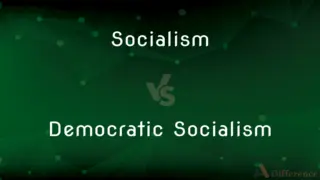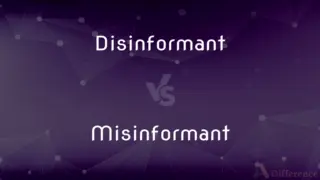Motto vs. Principle — What's the Difference?
By Maham Liaqat & Fiza Rafique — Updated on May 8, 2024
Mottoes are catchy phrases that encapsulate a belief or ideal, often public and memorable; principles are fundamental truths or propositions that serve as the foundation for behavior and belief, typically more abstract and philosophical.

Difference Between Motto and Principle
Table of Contents
ADVERTISEMENT
Key Differences
A motto is a succinct phrase or slogan that is often used by organizations, families, or individuals to reflect their beliefs or aspirations and to inspire action. Whereas, a principle is a fundamental belief or doctrine that guides decisions and actions in a more consistent and ethical manner.
Mottos are designed to be easily remembered and are frequently displayed or mentioned publicly to reinforce identity and values. On the other hand, principles are more about internal guidance and moral grounding, not necessarily intended for public display but for personal or organizational integrity.
Mottos can be specific to a particular context or situation, often capturing the spirit of a moment or movement. In contrast, principles are generally universal, applicable across various situations and unchanging over time.
While mottos may change as goals or circumstances evolve, principles tend to remain stable, providing a steady moral compass.
Mottos are often crafted to be motivational and are used in marketing and rallying calls. Principles, however, are typically more reflective, providing frameworks for behavior rather than immediate inspiration.
ADVERTISEMENT
Comparison Chart
Definition
A brief statement used as a slogan or to express a goal or ideal.
A fundamental truth that serves as the foundation for a system of belief or behavior.
Usage
Public, often used for inspiration or rallying.
Internal, used for personal guidance and ethical reasoning.
Stability
Can change with goals or circumstances.
Generally remains stable over time.
Purpose
To motivate and encapsulate ideals briefly.
To guide decisions and actions based on ethical or moral grounds.
Typical Context
Advertising, organizational identities, family crests.
Personal ethics, organizational policies, philosophical discussions.
Compare with Definitions
Motto
A phrase expressing the spirit or purpose of an institution.
The school’s motto, “Knowledge is Power,” is prominently displayed in every classroom.
Principle
A general scientific theorem or law that has broad applicability.
The principle of gravity explains why objects fall to the ground.
Motto
A maxim adopted as an expression of a guiding principle.
Her personal motto, “Keep smiling,” helped her through tough times.
Principle
A rule or belief governing one’s personal behavior.
One of her core principles is always to help those in need.
Motto
A slogan used by an organization to summarize its values or mission.
The non-profit's motto, “Every heart counts,” is on all its promotional materials.
Principle
A basic idea or rule that explains or controls how something happens or works.
The principles of democracy are held to be universal.
Motto
A short phrase that represents a guiding belief of an individual or group.
The family’s motto, “Fortune favors the bold,” decorated the grand hallway.
Principle
A fundamental truth that forms the foundation for a system of belief or behavior.
His guiding principle, honesty in all transactions, made him a respected businessman.
Motto
A war cry or slogan used particularly in military or heraldic contexts.
The ancient clan’s motto, “Strike hard, strike fast,” was known throughout the region.
Principle
A moral rule or belief that helps you know what is right and wrong and that influences your actions.
They operated on the principle that all members should have equal rights.
Motto
A sentence, phrase, or word, prefixed to an essay, discourse, chapter, canto, or the like, suggestive of its subject matter; a short, suggestive expression of a guiding principle; a maxim.
Principle
A rule or standard, especially of good behavior
A man of principle.
Motto
A motto (derived from the Latin muttum, 'mutter', by way of Italian motto, 'word', 'sentence') is the general motivation or intention of an individual, family, social group or organization. Mottos are usually found predominantly in written form (unlike slogans, which may also be expressed orally), and may stem from long traditions of social foundations, or from significant events, such as a civil war or a revolution.
Principle
A principle is a proposition or value that is a guide for behavior or evaluation. In law, it is a rule that has to be or usually is to be followed.
Motto
A short sentence or phrase chosen as encapsulating the beliefs or ideals of an individual, family, or institution
The family motto is ‘Faithful though Unfortunate’
Principle
A fundamental truth or proposition that serves as the foundation for a system of belief or behaviour or for a chain of reasoning
The basic principles of justice
Motto
A phrase which recurs throughout a musical work and has some symbolical significance
They were developing the use of leitmotifs or mottoes that appear throughout an opera
Principle
A general scientific theorem or law that has numerous special applications across a wide field.
Motto
A brief statement used to express a principle, goal, or ideal
“We explain that when someone is cruel, or acts like a bully, you don't stoop to their level—no, our motto is ‘when they go low, we go high'” (Michelle Obama).
Principle
A fundamental source or basis of something
The first principle of all things was water
Motto
(heraldry) A sentence, phrase, or word, forming part of an heraldic achievement.
Principle
A basic truth, law, or assumption
The principles of democracy.
Motto
(obsolete) A paper packet containing a sweetmeat, cracker, etc., together with a scrap of paper bearing a motto.
Principle
The collectivity of moral or ethical standards or judgments
A decision based on principle rather than expediency.
Motto
(intransitive) To compose mottos.
Principle
A fixed or predetermined policy or mode of action.
Motto
A sentence, phrase, or word, forming part of an heraldic achievment.
Principle
A basic or essential quality or element determining intrinsic nature or characteristic behavior
The principle of self-preservation.
Motto
A sentence, phrase, or word, prefixed to an essay, discourse, chapter, canto, or the like, suggestive of its subject matter; a short, suggestive expression of a guiding principle; a maxim.
It was the motto of a bishop eminent for his piety and good works, . . . "Serve God, and be cheerful."
Principle
A rule or law concerning the functioning of natural phenomena or mechanical processes
The principle of jet propulsion.
Motto
A favorite saying of a sect or political group
Principle
(Chemistry) One of the elements that compose a substance, especially one that gives some special quality or effect.
Principle
A basic source. See Usage Note at principal.
Principle
A fundamental assumption or guiding belief.
We need some sort of principles to reason from.
Principle
A rule used to choose among solutions to a problem.
The principle of least privilege holds that a process should only receive the permissions it needs.
Principle
Moral rule or aspect.
I don't doubt your principles.
You are clearly a person of principle.
It's the principle of the thing; I won't do business with someone I can't trust.
Principle
(physics) A rule or law of nature, or the basic idea on how the laws of nature are applied.
Bernoulli's Principle
The Pauli Exclusion Principle prevents two fermions from occupying the same state.
The principle of the internal combustion engine
Principle
A fundamental essence, particularly one producing a given quality.
Many believe that life is the result of some vital principle.
Principle
A source, or origin; that from which anything proceeds; fundamental substance or energy; primordial substance; ultimate element, or cause.
Principle
An original faculty or endowment.
Principle
Misspelling of principal
Principle
(obsolete) A beginning.
Principle
(transitive) To equip with principles; to establish, or fix, in certain principles; to impress with any tenet or rule of conduct.
Principle
Beginning; commencement.
Doubting sad end of principle unsound.
Principle
A source, or origin; that from which anything proceeds; fundamental substance or energy; primordial substance; ultimate element, or cause.
The soul of man is an active principle.
Principle
An original faculty or endowment.
Nature in your principles hath set [benignity].
Those active principles whose direct and ultimate object is the communication either of enjoyment or suffering.
Principle
A fundamental truth; a comprehensive law or doctrine, from which others are derived, or on which others are founded; a general truth; an elementary proposition; a maxim; an axiom; a postulate.
Therefore, leaving the principles of the doctrine of Christ, let us go on unto perfection.
A good principle, not rightly understood, may prove as hurtful as a bad.
Principle
A settled rule of action; a governing law of conduct; an opinion or belief which exercises a directing influence on the life and behavior; a rule (usually, a right rule) of conduct consistently directing one's actions; as, a person of no principle.
All kinds of dishonesty destroy our pretenses to an honest principle of mind.
Principle
Any original inherent constituent which characterizes a substance, or gives it its essential properties, and which can usually be separated by analysis; - applied especially to drugs, plant extracts, etc.
Cathartine is the bitter, purgative principle of senna.
Principle
To equip with principles; to establish, or fix, in certain principles; to impress with any tenet, or rule of conduct, good or ill.
Governors should be well principled.
Let an enthusiast be principled that he or his teacher is inspired.
Principle
A basic generalization that is accepted as true and that can be used as a basis for reasoning or conduct;
Their principles of composition characterized all their works
Principle
A rule or standard especially of good behavior;
A man of principle
He will not violate his principles
Principle
A basic truth or law or assumption;
The principles of democracy
Principle
A rule or law concerning a natural phenomenon or the function of a complex system;
The principle of the conservation of mass
The principle of jet propulsion
The right-hand rule for inductive fields
Principle
Rule of personal conduct
Principle
(law) an explanation of the fundamental reasons (especially an explanation of the working of some device in terms of laws of nature);
The rationale for capital punishment
The principles of internal-combustion engines
Common Curiosities
How does a principle differ from a law?
A principle is a foundational belief or ethical guideline, while a law is a rule established by authority, society, or custom that people must follow.
Why might an organization choose to have a motto?
Organizations use mottos to easily communicate their goals, culture, or values to both the public and their own members.
How are principles used in everyday life?
Principles guide daily decisions and behaviors, ensuring they align with one’s ethical beliefs and moral standards.
Can a motto be a principle?
While a motto can reflect underlying principles, it is generally more about expression and motivation rather than serving as a rule for behavior.
Are principles always moral or ethical?
Principles are often moral or ethical, but they can also be fundamental truths or concepts in other domains, like science.
What is the difference between a motto and a tagline?
A motto is a general statement of belief or intent, while a tagline is specifically crafted for marketing purposes to promote a brand or product.
What role do mottos play in educational institutions?
Mottos in educational settings encapsulate the ethos and aspirations of the institution, often guiding the community’s spirit.
What is the purpose of a motto?
A motto serves to inspire, motivate, and convey the core values or aspirations of a group or individual.
How can a motto impact a company’s image?
A well-chosen motto can positively impact a company’s image by succinctly communicating its identity and values to the public.
How are principles developed?
Principles are developed through personal experiences, cultural influences, education, and philosophical reasoning.
How do principles influence leadership?
Leaders who adhere to clear principles are often more consistent, trustworthy, and respected.
Is it important for individuals to have personal mottos?
Personal mottos can provide individuals with motivation and a succinct way to express their life philosophies.
How can understanding principles help in conflict resolution?
Understanding underlying principles can provide common ground for resolving disputes and ensuring decisions are ethically sound.
Can principles change over time?
While principles are generally stable, they can evolve based on new experiences or insights.
What are examples of common mottos?
Examples include “Liberty, Equality, Fraternity” or “In God We Trust.”
Share Your Discovery

Previous Comparison
Porto vs. Port
Next Comparison
Bonehead vs. SkinheadAuthor Spotlight
Written by
Maham LiaqatCo-written by
Fiza RafiqueFiza Rafique is a skilled content writer at AskDifference.com, where she meticulously refines and enhances written pieces. Drawing from her vast editorial expertise, Fiza ensures clarity, accuracy, and precision in every article. Passionate about language, she continually seeks to elevate the quality of content for readers worldwide.















































